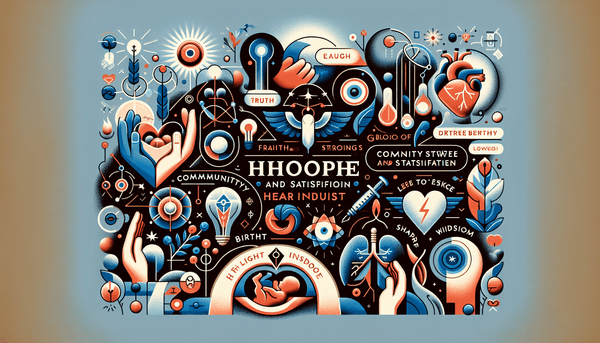Trusting in the Lord: A Foundation for Peace
Trusting in the Lord is not merely a spiritual cliché; it's a profound principle that can anchor our lives in times of uncertainty. Isaiah 26:4 reminds us that 'the Lord, the Lord himself, is the Rock eternal,' a testament to God's unwavering nature. This eternal nature of God provides a source of stability; when we trust Him, we stand on solid ground. Trust is contrasted with self-reliance in Proverbs 3:5, which advises us to trust in the Lord with all our heart and not lean on our own understanding. Moreover, trust extends into our relationships with others, as highlighted in Ecclesiastes 4:9-10, which illustrates the benefits of companionship and mutual support. As we trust in God, we also learn to build trust with those around us, fostering relationships that reflect the love and unity we are called to embody.
Unity and Support in Community
The concept of 'together' is woven intricately into the fabric of the Bible, emphasizing the importance of community, unity, and support. Life's challenges can often feel insurmountable, but together, we can find the strength to overcome them. The Biblical model for mutual assistance and companionship is evident in verses like Hebrews 10:24-25, which encourage us to spur one another on toward love and good deeds, not giving up meeting together. This togetherness is not just a feel-good sentiment; it's a practical and spiritual necessity, as we uplift one another, share burdens, and experience the strength that comes from unity, as affirmed in Galatians 6:2, 'Carry each other's burdens, and in this way you will fulfill the law of Christ.'
The Resurrection Hope: A Glorious Future
The resurrection of the dead is one of the most glorious promises in the Bible, offering hope for a future where death is no more. The scriptures describe a day when those who have died in faith will be restored and revived, echoing the profound and central beliefs of the Christian faith as explored in our related blog post. This hope is beautifully captured in 1 Corinthians 15:52-57, where it is proclaimed that 'the dead will be raised imperishable, and we will be changed.' The return of Christ marks the culmination of this hope, as believers are assured they will spend eternity with their Savior. This assurance, as seen in 1 Thessalonians 4:16-17, is a testament to the victory over death and the eternal life promised to those who believe. The resurrection is not just a future event; it is a present source of comfort and joy for all who cling to the promises of God.
Contentment vs. Covetousness: A Heart Matter
The line between admiring what someone has and coveting can be subtle, yet the Bible provides clear guidance on this matter. Covetousness, as condemned in Exodus 20:17, is an unhealthy longing for what others possess, while contentment is a peaceful satisfaction with what we have. The Apostle Paul speaks to this in Philippians 4:11-13, where he shares the secret of being content in any and every situation. A heart free from covetousness and filled with contentment reflects inner beauty and modesty, qualities that are of great worth in God's sight, as 1 Peter 3:3-4 suggests. By focusing on the blessings we have and trusting in God's provision, we can live lives marked by joy and generosity.
The Birth of Jesus Christ: The Dawn of Salvation
The birth of Jesus Christ stands as a pivotal moment in history, fulfilling ancient prophecies and embodying the ultimate expression of God's love for humanity. Matthew 1:21 foretold the coming of a Savior who would save people from their sins, marking the beginning of a new covenant between God and humankind. The birth of Jesus, as announced in Luke 2:11-14, brought 'good news of great joy for all the people.' His life and teachings would transform countless lives and continue to do so today. The nativity story isn't just a tale from the past; it's a narrative that continues to inspire hope, love, and salvation to all who embrace its message.
The Joy of Giving: A Reflection of God's Love
Giving is more than an act of charity; it's a reflection of God's love and generosity. In 2 Corinthians 9:7, we are reminded that God loves a cheerful giver, highlighting the attitude with which we should give. This joy of giving is not limited to material possessions but encompasses time, kindness, and love. When we give from the heart, as Acts 20:35 tells us, we find that it is more blessed to give than to receive. This principle of generosity is a thread that runs through the entire Bible, inviting us to experience the blessings and fulfillment that come from selflessly sharing with others.
Conclusion
As we conclude our journey through the Biblical insights on faith, trust, hope, and love, we are reminded of the profound impact these principles can have on our lives. From the unchanging nature of God to the communal strength of believers, the promise of resurrection, the beauty of contentment, the joy of Christ's birth, and the blessings of giving, scripture offers us a blueprint for a life anchored in eternal truths. This exploration, akin to our delve into various Bible topics from Nebuchadnezzar to the teachings of Jesus, serves as a catalyst for deeper reflection, encouraging us to integrate these timeless teachings into our daily walk with God.






